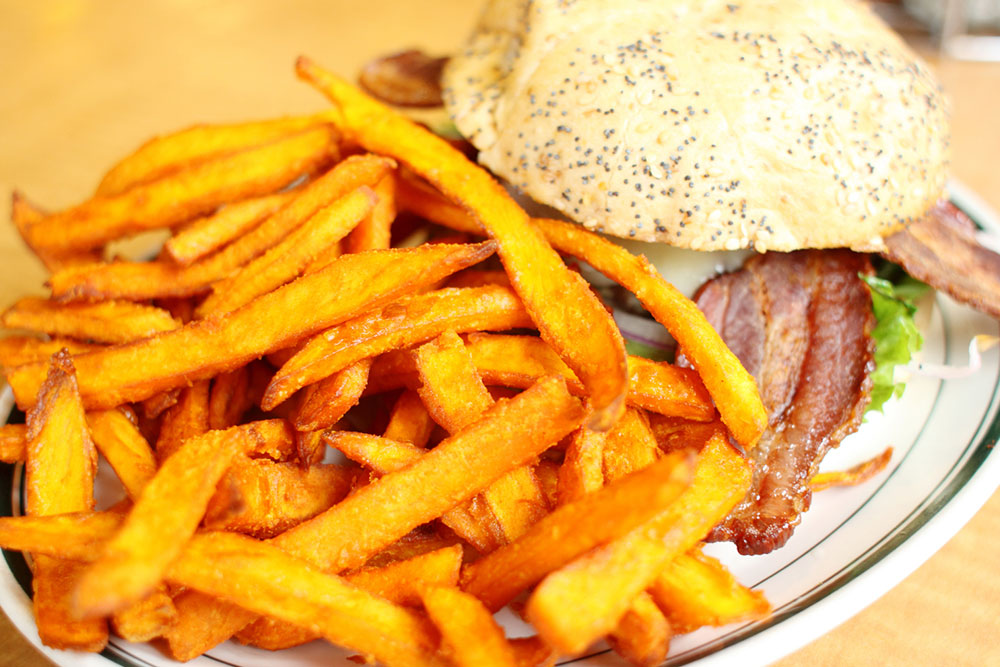Avoid these 10 foods for better eye health

Lifestyle and daily habits can have a huge impact on eye health. In fact, there is a close connection between what one eats and the health of their eyes. Certain foods, like green leafy vegetables, fatty fish like salmon and mackerel, nuts, and carrots, are great for eyesight. On the other hand, a few foods can contribute to poor eye health and worsen existing vision-related issues, making it important to limit or avoid them.
French fries
The intake of fried foods, in general, is bad for the body in the long run. This is why one is likely to find fried foods often included on all kinds of “worst foods” lists. When it comes to eye health, snacks like French fries or deep-fried chicken contain trans fats that accelerate age-related eye diseases such as macular degeneration. Multiple studies have linked high trans fat intake with the development of this condition in those over 50. In fact, such studies found that even when healthy, anti-inflammatory foods rich in omega-3 fatty acids were added to daily meals containing fried snacks, the benefits of those healthy fats were overshadowed by the prevalence of fried foods.
Sunflower oil
Several studies have found a link between linoleic acid, a type of unsaturated fats, and retinopathy and AMD. Some cooking oils that are rich in linoleic acid are corn oil, safflower oil, soybean oil, sesame oil, and sunflower oil.
Processed foods
Hyper-processed foods often come in packages or covers serving as quick meals. However, packaged cookies, chips, and candy are among the worst foods one can choose for their health. These foods contain a large amount of chemical preservatives to prolong their shelf life. Many studies have found the negative impact such preservatives have on the eye health. Additionally, packaged cookies also contain unhealthy fats and inflammatory ingredients that can cause a range of cardiovascular and digestive issues apart from eye-related issues. Nevertheless, the worst thing about these foods is that they contain little to zero nutritional value.
Further, packaged foods like chips also contain high amounts of sodium, which can elevate blood pressure in the long run. High blood pressure can damage the blood vessels around the eyes, contributing to vision loss or blurry vision, among other health issues.
Sugary drinks
Sugar has inflammatory properties, meaning that excessive intake of food containing sugar can harm overall health. Further, when one drinks too many sugary drinks on a daily basis, they risk raising their blood sugar beyond normal levels. This can cause damage to the retina in the eye. Additionally, if someone already has eye- or vision-related issues, it is wise to limit or, if possible, cut sugar out entirely from their daily meals. Doing so ensures that they do not increase the risk of associated health issues like diabetic retinopathy and AMD.
Pickles
Salt and other sodium-rich foods tend to raise blood pressure, increasing the risk of hypertension. Pickles are one of the foods rich in sodium, which has been linked to an increased risk of cataracts. This is because sodium-induced hypertension causes damage to the blood vessels in and around the retina. This kind of retinal vascular damage is known as hypertensive retinopathy, which can lead to vision impairment. So, it is important to keep sodium intake in check to lower the risk of such health concerns. Apart from pickles, some other high-sodium foods to avoid for better eye health are deli meats and canned foods. Here, checking the food label is a key step to avoid excessively salty foods.
Pasta
Simple carbohydrates, found in foods like pasta, rice, and white bread, can lead to health issues in the long run. Such foods can be easily digested and absorbed, causing a rapid spike in blood sugar. This can cause issues such as hyperglycemia (or high blood sugar) and, in the long term, lead to eye-related issues like diabetic retinopathy, AMD, and cataracts. Additionally, foods loaded with simple carbohydrates can increase cholesterol and the risk of heart disease.
Shellfish
Shellfish and some kinds of fish contain traces of mercury, which, in the long run, has the potential to cause eye damage. The groups that should avoid shellfish at all costs are pregnant women (especially if they are nursing) and children. Shellfish has its fair share of health benefits, but its mercury content makes it one of the top foods to avoid for better eye health.
Processed meats
The high amount of sodium in processed meat-based foods like bacon, hot dogs, and deli meats can contribute to the development of hypertensive retinopathy. Additionally, they can also cause issues such as choroidopathy, a condition referring to a steady buildup of fluid under the retina. Apart from these health issues, processed meat is associated with a higher risk of neuropathy in which the blood flow is obstructed. So, one must limit processed meat in their daily meals as much as possible.
Margarine
Margarine contains trans fats, which can raise cholesterol levels and, by extension, the risk of developing eye problems and cardiovascular illnesses. A good way to spot trans-fat-heavy margarine is by checking its structure. The more solid a given pack of margarine, the greater the percentage of trans fat it contains.
Coffee
Caffeine has a host of properties that can damage the eyes in the long run. For one, it has inflammatory properties that can negatively affect the blood vessels in and around the eyes. Here, excessive coffee intake increases the blood pressure inside the eye (a condition known as increased intraocular pressure) and ocular hypertension, both of which can contribute to vision loss.
One should consult a doctor or a registered nutritionist before making drastic changes to their meal plans. Professional guidance here can help one make sustainable changes and prevent nutritional deficiencies based on their specific needs.



